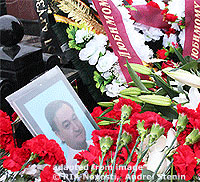Russian politicians, experts slam EU for passing Magnitskiy resolution

(Interfax – October 24, 2012) The resolution on the Magnitskiy (Magnitsky) list passed by the European Parliament is “designed to undermine contacts between Russia and Europe”, Russian Interfax news agency reported on 24 October, quoting head of the State Duma International Affairs Committee Aleskey Pushkov.
Politicians
On 23 October the European lawmakers passed a resolution requiring the EU to draw up a list of officials implicated the 2009 death of lawyer Sergey Magnitskiy while he was held in prison.
“The European Parliament’s resolution is aimed at separating Europe and Russia,” Pushkov told Interfax.
He said that recently there had been many positive steps bringing Russia and the EU member states closer. “However, the European Parliament’s resolution is undermining this positive reciprocal movement,” the Russian MP said.
Pushkov said it was quite obvious that the Magnitskiy list topic had “migrated to the European Parliament from the USA”.
“This was done thanks to the efforts of several senators who are engaged in professional anti-Russian activities, and also the efforts of Hermitage Capital head William Browder, who spares no effort or financial resources to promote the anti-Russian resolution at all international venues from US Congress to the PACE, OSCE and the European Parliament,” Pushkov said.
According to him, during his private meetings with European parliamentarians he came to the conclusion that the topic of “Magnitskiy’s death was, until recently, little known in Europe”. Thus, the topic is “totally artificial”, the Russian MP said.
First deputy chairman of the State Duma International Affairs Committee Leonid Kalashnikov has described the resolution as “yet another instrument to put pressure on Russia”, Ekho Moskvy news agency reported.
Kalashnikov said that, by focusing on the death of Sergey Magnitskiy, the European Parliament was using the policy of double standards to be able to influence Russia’s internal political life.
Vice president of the PACE and deputy head of its Russian delegation Leonid Slutskiy described the resolution as “extremely politicized”, Interfax reported.
“This is another act of blatant interference in Russia’s internal affairs and overt pressure on our judicial system. Russia will not leave these attempts unanswered,” Slutskiy said.
First deputy speaker of the Federation Council Aleksandr Torshin doubts that the European Union will impose sanctions on Russia in connection with the resolution, Interfax reported.
“I have serious doubts that the EU is going to impose sanctions on Russia, taking into account that the allegations made against Russia are unfounded,” Torshin told Interfax.
Torshin said he was not surprised by such an aggressive resolution. “We have not heard anything good about Russia from the European Parliament for a long time,” he said.
Experts
However, Russian experts interviewed by Russian RIA Novosti agency believe that the probability that sanctions will be imposed on Russia is quite high.
“I think they (the EU Council) will follow the recommendations. I think that one way or another, most of the EU countries will do the same with the Magnitskiy list,” deputy head of the Plekhanov Russian Economic University and member of the Public Chamber Sergey Markov told RIA Novosti.
According to the analyst, the resolution was expected, since it was passed “against the background of deteriorating relations between Russia and the West”. Although Russia and the European Union are linked by more intensive economic and humanitarian relations, than, for example, Russia and the USA, European leaders do not attempt to counteract this trend, Markov said.
The political analyst believes that if this happens Russia will definitely retaliate.
“There are two types of responses. A weak answer would be to an attempt to restrict somebody from entering Russia, and a strong response would be an asymmetrical answer,” Markov said.
According to the expert, such a strong response could be, for example, the development of the Russian aviation industry, which would prevent Boeing and Airbus to capture the Russian aviation market.
Director of the Institute for Strategic Assessments Sergey Oznobishchev agrees.
“The probability is very high that they will listen to the European Parliament and pass it (the Magnitskiy list),” Oznobishchev told RIA Novosti.
According to him, the existing economic ties between Russia and the EU and the fact that the two sides are interested in partnership will play no role in this matter and will not prevent the EU Council from passing their own Magnitskiy lists.
The expert said that, if this happens, Russia is likely to respond symmetrically by drawing up its own list.
According to first vice president of the Centre for Political Technologies Aleksey Makarkin, the Europeans are trying to build balanced relations with Russia.
“They have an economic interest in Russia, as well as political interest, because Russia is the European Unions’ neighbour,” the expert said.
“On the one hand, they approved the report. On the other hand, European Parliament’s resolution is advisory and cannot prevent citizens of other countries to visit Europe,” the expert said.
At the same time Makarkin pointed out that “there is the factor of public opinion, there are a number of human rights organizations which demand sanctions in connection with the Magnitskiy case”.
According to him, it would be up to the authorities of concrete states to decide.
Makarkin said that relations between the EU and Russia “will be quite cool”.
